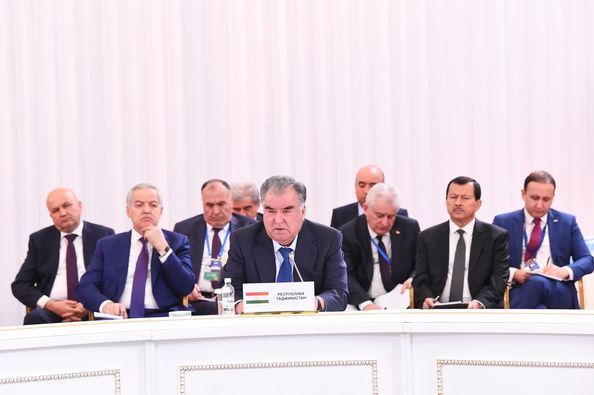This past week, Tajik President Emomali Rahmon personally appealed to Russian President Vladimir Putin not to treat Central Asian countries as the former Soviet Union, and also met with Uzbek President Shavkat Mirziyoyev to discuss a wide range of bilateral cooperation issues; Rahmon proposed for Central Asia and Russia to create a "preventive economy" project to join forces during the global crisis, and the Tajik Foreign Minister Discussed Rule of Law Issues in Department of Peacekeeping Operations with UN Secretary-General.

Image source: Sputnik
On October 14, during the Central Asia-Russia Summit in Astana, in the presence of the press and the heads of the states of Kazakhstan, Kyrgyzstan, Turkmenistan and Uzbekistan, Emomali Rahmon addressed Russian President Vladimir Putin and asked him to treat the CA region with respect (Current Time, Asia Plus, Avesta, Eurasianet). “Tajikistan has always respected the interests of its main strategic partner, the Russian Federation, and the country wants to feel mutual respect”, said Emomali Rahmon. According to Rahmon, Russia is conducting food cooperation and developing trade turnover, but does not show equal treatment in return. Rahmon also criticized Putin for the refusal of Russian high-ranking officials to fly to Tajikistan; in particular, they refused to attend a business forum in Dushanbe even after a personal conversation was held between Rahmon and Putin. According to the Tajik president, this shows that Russia does not treat Central Asian countries as equal partners. This speech at the summit was the first public criticism of Vladimir Putin by the president of Tajikistan.
Emomali Rahmon also met with Uzbek President Shavkat Mirziyoyev in Astana within the framework of the meeting of the Council of CIS Heads of State and the first Central Asia-Russia Summit (Asia Plus). Rahmon expressed satisfaction with the positive results of the development of partnership and allied relations between Tajikistan and Uzbekistan. During the meeting, the heads of the states discussed the expansion of cooperation in priority areas for the parties and other topical issues of interest, as well as named the full implementation of previously adopted agreements as a priority goal.
Also at the Russia-Central Asia summit, Rahmon spoke of the need to launch a joint project, tentatively called "preventive economy," to combine efforts in times of crisis (Asia Plus). "We believe that in the current circumstances, the countries of Central Asia and Russia need to find non-standard approaches to the formation of the most effective model of economic cooperation," said the president. In turn, Vladimir Putin called on Central Asian countries to join import substitution programs. He stressed that Russia is open to strengthening multilateral cooperation "with its Central Asian friends," in particular, to participate in the creation of new supply chains and building alternative logistic links. He pointed out that Russia's interaction with the Central Asian Five is developing at a good pace: in the first half of this year, mutual trade increased by 16%. Russia is a leading investor in Central Asian economies and, as the Russian leader noted, is also ready to provide practical assistance in restoring Central Asia's unified energy system, which "will certainly increase the energy security of all countries in the region".
On October 17, Tajik Foreign Minister Sirojiddin Muhriddin met with UN Assistant Secretary-General Alexander Zuev in Dushanbe (Avesta, MFA TJ). The meeting took place on the sidelines of the upcoming high-level International Conference on International and Regional Border Security and Management Cooperation to Combat Terrorism and Prevent Terrorist Movement. During the meeting, the two parties discussed bilateral cooperation between Tajikistan and the UN, including the expansion of peacekeeping operations, and Tajikistan's role in providing personnel, humanitarian de-mining, as well as other topical issues.

